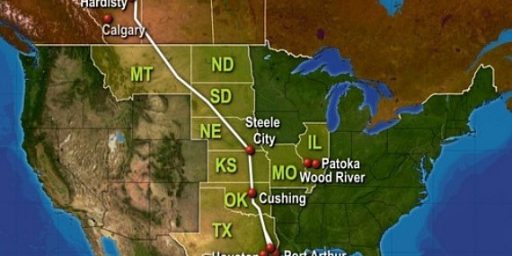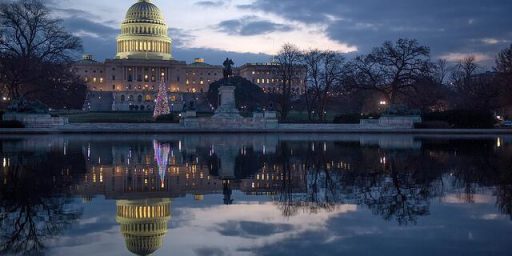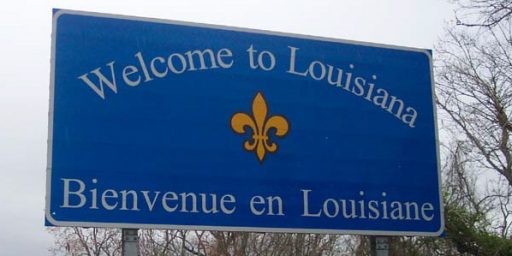Congress to Apologize for Lynching
On Monday, the U.S. Senate will pass a resolution apologizing for not having done more to prevent nearly 5000 lynchings of black Americans between 1882 and 1968.
Repairing Senate’s Record on Lynching (WaPo, A1)
[…] a black man named Stephen Williams, accused of manhandling a white woman, was beaten and hanged about 3 in the morning on Oct. 20, 1894. A masked mob snatched him from his jail cell and dragged him as he pleaded for his life. “When the Marlboro bridge was reached the rope was quickly tied to the railing and amid piteous groans Williams was hurled into eternity,” The Washington Post reported.
At the time, there was no federal law against lynching, and most states refused to prosecute white men for killing black people. The U.S. House of Representatives, responding to pleas from presidents and civil rights groups, three times agreed to make the crime a federal offense. Each time, though, the measure died in the Senate at the hands of powerful southern lawmakers using the filibuster.
The Senate is set to correct that wrong Monday, when its members will vote on a resolution to apologize for the failure to enact an anti-lynching law first proposed 105 years ago. “The apology is long overdue,” said Sen. George Allen (R-Va.), who is sponsoring the resolution with Sen. Mary Landrieu (D-La.). “Our history does include times when we failed to protect individual freedom and rights.” The Senate’s action comes amid a series of conciliatory efforts nationwide that include reopening investigations and prosecutions in Mississippi. Advocates say the vote would mark the first time Congress has apologized for the nation’s treatment of African Americans.
Allen’s involvement could help mend his rift with black Virginians who criticized him for hanging a noose outside his law office, displaying a Confederate flag in his home and proclaiming a Confederate History Month while governor. Landrieu said she was motivated to propose the bill after seeing the book “Without Sanctuary: Lynching Photography in America,” a collection of postcards taken at lynching scenes. “The intensity and impact of the pictures tell a story . . . that written words failed to convey,” Landrieu said. “It has been an extremely emotional, educational experience for me. And the more I learned, the more sure I became [about] the effort to pass this resolution.”
Towns across America bear reminders of the shameful tradition that claimed 4,743 lives between 1882 and 1968, research shows. In Alexandria, a lamppost at Cameron and Lee streets served to lynch Joseph McCoy on April 23, 1897. In Annapolis, a bluff near College Creek was the site of Henry Davis’s lynching four days before Christmas in 1906. Lynching also remains imbedded in the consciousness of African American families, some of whom can name an ancestor or a friend who fell prey to mob justice, often meted out with spectators watching and memorialized with postcards of the victims hanging or pieces of the ropes that had snapped their necks.
If this seemingly empty gesture will help ease the pain of one of the darkest aspects of American history, then I’m all for it. While I tend to agree with George Carlin that “symbols are for the symbol minded,” sometimes these things actually matter to people.
That said, the fault for these 4,743 murders rests with the perpetrators of those crimes, not the U.S. Senate. Certainly, there were a fair number of racists in Congress who cared not a whit about the welfare of our black citizens. Still, until the 1950s, it was simply beyond the comprehension of most Americans that murders of citizens of a state by other citizens of the same state were somehow the business of Congress.
Yes, the 14th Amendment forbad states to “deny to any person within its jurisdiction the equal protection of the laws.” Further, unlike any previous Amendment, it specified that, “The Congress shall have power to enforce, by appropriate legislation, the provisions of this article.” But it was not until the Civil Rights Act of 1964 that it was understood to mean that the federal government had a right to intervene in the absence of explicit discrimination by the state government. The fact that juries refused to convict whites for the murders of blacks, while unconscionable, was simply considered local business.




The fact that juries refused to convict whites for the murders of blacks, while unconscionable, was simply considered local business.
Yes, wrong indeed. Congress should next apologize for the jury who who refused to convict OJ for the murder of two whites.
It’s not so much of what happened years ago,but the fact that still much has not change. The open minded community has a lot to say about racism. Still,
I reckon, we all do something about it! and, fast!don’t you?!
Acc to p. 13 of Thomas Sowell’s “Black Rednecks and White Liberals,” The Violence for which white Southerners became most notorious was lynching. Like other aspects of the redneck culture, it has been attributed to race…In fact, most lynching victims were white….
I completely disagree. It is the business of Congress to enact legislation that protects ALL of its citizens. This is not a foreign concept in America today, nor was it a foreign concept during that time period. The truth is that our government spent its time, energy, and money protecting one group of people– white Americans.
It it had been white Americans that were being targeted by hate groups Congress would have responded.
An apology does nothing, however atleast the government is finally admitting that they purposely facilitated racist practices against American citizens.
Also, it is not enough to say that only those who actually hung black people in trees are responsible. In reality, it America had a culture of apathy concerning the terrorism that was being committed against blacks. Crowds of Americans would come to see the lynch victims, pose for pictures. In fact, lynchings were advertised in the newspaper. People brought their picnic baskets and children to see the events. Lynching was a community event. And our government new what was going on and did nothing to protect Americans who were black. Why should one group of Americans get more protection from the government than another?
Excuse the typos.
No, actually this is inaccurate. The problem was not that the idea of racial politics was foreign to federal lawmakers, but that the south wanted to keep doing what it was doing. There were a number of anti-lynching bills (and other anti-racism bills such as bills against poll taxes) proposed to congress that could have had majority support, starting in the 1930’s, but they were filibustered by southern representatives. Strom Thurmond was notorious for this practice (kind of ironic given the current political use of filibusters).
To underscore the point, some of these same southern congresspeople were very supportive of racist legislation aimed at forcing all states to behave in a certain way toward blacks — one of the most egregious involved “deportation” to Liberia.
Here is a good site on this whole history:
http://www.pbs.org/wnet/jimcrow/struggle_congress2.html
Who were the 20 Senators who did not co-sponsor the legislation?